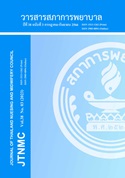Relationships of Activities of Daily Living, Risk Behaviors, Dependency, Social Support, and Quality of Life in Stroke patients at a Private Hospital in Bangkok
DOI:
https://doi.org/10.60099/jtnmc.v38i03.264220Keywords:
stroke, quality of life, daily living, risk behaviors, dependency, social supportAbstract
Introduction Stroke is a significant concern for global public health systems, including Thailand. It affects the quality of life for patients.
Objective To examine the relationship between activities of daily living, risk behaviors, dependency, social support, and the quality of life among stroke patients.
Design Descriptive correlational research
Methodology The study included a sample of stroke patients who received outpatient care at a private hospital in Bangkok. Purposive sampling was employed according to the inclusion criteria, and the sample size of 123 was determined following principles of power analysis. Data collection tools included demographic questionnaires and five assessment forms: an assessment of activities of daily living, assessment of risky self-care behaviors, assessment of dependency, assessment of social support, and assessment of quality of life. The assessments revealed content validity indices of 1.0, 1.0, .88, .75, and .92, respectively. Test-retest reliability yielded Cronbach's alpha coefficients of .97, .80, .84, .84, and .87, respectively. Data were collected through self-administration and structured interviews. Statistical analyses involved descriptive statistics and Pearson's correlation coefficient.
Results More than half of the sample were male (55.3%). The overall quality of life was high (M= 4.36, SD = 0.75). Pearson correlation analysis revealed that activities of daily living (r = .800, p < .001), dependency (r = .803, p < .001), and social support (r = .232, p < .001) were positively correlated with the quality of life. On the other hand, risk behaviors (r= -.029, p < .001) revealed a statistically significant negative correlation with the quality of life among the participants.
Recommendations Healthcare team and caregivers should provide support to perform activities of daily living, minimize dependency and risk behaviors, as well as provide social support. These efforts collectively aim to enhance the overall quality of life for patients.
Downloads
References
World Stroke Organization [WSO]. Annual report 2021. [Internet]2022 [cited 2022 Jul 13]. Available from: https://www.world-stroke.org/news-and-blog/news/wso-annual-report-for-2021
Bureau of Information Office of The Permanent Secretary of MOPH.MOPH news. [internet]. 2020 [cited 2020 May 18]. Available from http://www.thaincd.com/2016/mission3 (in Thai)
Wongsa D, Soivong P, Chaiard J. Quality of Life Among Stroke Persons Within Six Months Post Diagnosis. Nursing Journal [Internet]. 2018 [cited 2023 Aug 27];45(2):40-50 Available from: https://he02.tci-thaijo.org/index.php/cmunursing/article/view/145044/107206 (in Thai)
Sittiritkawin R. Effect of rehabilitation on the quality of life of stroke patients: in Thasae district, Chumphon province. Region 11 Medical Journal[Internet] 2021[cited 2023 Aug 27];36(1): 98-114 Available from: https://he02.tci-thaijo.org/index.php/Reg11MedJ/article/view/254539/176385 (in Thai)
Utharot W, Phutthikhamin N. Quality of life of stroke patients with cognitive impairment. North-Eastern Thai journal of neuroscience [Internet] 2020 [cited 2023 Aug 27];15(4):34-45 Available from: https://ne-neurosci.com/journal/71a517aeca504d0089a9261fb5caa83b (in Thai)
Jintaganon T. Health Related Quality of Life in Stroke Survivors. Region 4-5 Medical Journal [Internet] 2019[cited 2023 Aug 27]; 38(2): 114-124 Available from: https:// https://he02.tci-thaijo.org/index.php/reg45/article/view/208539/144586 (in Thai)
Kerdin M, Kittipimpanon K, Tantiprasoplap S. Association between Health Literacy, Self-Care Behaviors, and Clinical Outcomes among People with Chronic Kidney Disease in Primary Care Units. Journal of Thailand Nursing and Midwifery Council [Internet] 2023[cited 2023 Aug 27];38(2): 64-76 Available from: https://he02.tci-thaijo.org/index.php/TJONC/article/view/262242/179875 (in Thai)
Schaefer C, Coyne JC, Lazarus RS. The healthrelated functions of social support. J Behav Med. 1981; 4(4):381-406. DOI: 10.1007/BF00846149.
Phiwkhao S, Preechawong S, Jitpanya C. Relationships among Coping, Social Support, Perceived Self-efficacy and Health Related-Quality of Life in First-Time Stroke Patients. HCU Journal [Internet] 2020[cited 2023 Aug 27]; 21(41):123-136 Available from: https://he01.tci-thaijo.org/index.php/HCUJOURNAL/article/view/146027/107718 (in Thai)
Khamcharoen J, Puwarawuttipanit W, Kositamongkol S. Factors Influencing Ischaemic Stroke Patients’ Medication Adherence. Journal of Thailand Nursing and Midwifery Council [Internet] 2022[cited 2023 Aug 27];37(2): 111-127 Available from: https://he02.tci-thaijo.org/index.php/TJONC/article/view/255915/175660 (in Thai)
Ferrans CE, Zerwic JJ, Wilbur JE, Larson JL. Conceptual model of health-related quality of life. Journal of Nursing Scholarship 2005; 37(4):336-42. doi: 10.1111/j.1547-5069.2005.00058. PubMedPMID: 16396406.
Pongsakchat V. Determining an Appropriate Sample Size. Burapha University;2020. (in Thai)
Lumrod N, Hoikum A, Sriwongwan W, Klaibua S, Ruamsook T. The Relationships between Personal Factors, Social Factors, and Health Literacy in Stroke Prevention among People at Risk of Stroke in Nonthaburi Province. Journal of Nursing and Education [Internet] 2023[cited 2023 Aug 27];16(2):28-39 Available from: https://he01.tci-thaijo.org/index.php/JHR/article/view/253777/173023 (in Thai)
Mahoney FL, Barthel D. Functional evaluation:the Barthel Index. Maryland State Med Journal 1965;14:61-5. PubMedPMID: 14258950.
Keawpugdee J, Silpasuwan P, Viwatwongkasem C, Boonyamalik P, Amnatsatsue K. A Hospital Readmission Risks Screening for Older Adult with Stroke: Tools Development and Validation of a Prediction. INQUIRY 2021; 58:1-10. doi: 10.1177/ 00469580211018285.PubMedPMID:PMC8155787.
Graf C. The Lawton instrumental activities of daily living scale. AJN. 2008;108:52-62.
Duncan PW., Lai SM., Bode RK., Perera S., DeRosa J. Stroke Impact Scale-16 A brief assessment of physical function. Neurology 2003;60(2):291-296. doi: 10.1212/01.wnl.0000041493.65665.d6. PubMedPMID:12552047
Grove SK, Gray JR. Understanding nursing research: building an evidence-based practice. 7th ed. St. Louis, MO: Elsevier Saunders; 2019.
Kitila S, Thammakun T, Chankong W. Factors Affecting Quality of Life of Stroke Patients at Sirindhorn National Medical Rehabilitation Institute. J Prapokklao Hosp Clin Med Educat Center [Internet] 2019[cited 2023 Aug 27];36(2):105-114 Available from: https://he02.tci-thaijo.org/index.php/ppkjournal/article/view/160815/132580 (in Thai)
Desaravinid C. Factors Related to Self-Care Behavior Among People at Risk of Stroke in Nakhon Ratchasima Province. Journal of Primary Care and Family Medicine [Internet] 2022[cited 2023 Aug 27];5(4):310-321 Available from: https://so03.tci-thaijo.org/index.php/PCFM/article/view/257637/176084 (in Thai)
Downloads
Published
How to Cite
Issue
Section
License
Copyright (c) 2023 The Journal of Thailand Nursing and Midwifery Council

This work is licensed under a Creative Commons Attribution-NonCommercial-NoDerivatives 4.0 International License.








